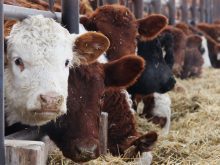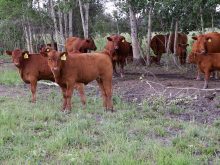For the week ending April 25, western Canadian feeder cattle markets traded $4 to $8 above prices from seven days earlier.
Early in the week, prices were relatively unchanged from the previous week.
On April 23, Alberta packers started buying fed cattle on a dressed basis at $486 per hundredweight delivered, up $11 per cwt. from the previous week. This spurred on stronger demand for all weight categories.
Read Also

Russian wheat exports start to pick up the pace
Russia has had a slow start for its 2025-26 wheat export program, but the pace is starting to pick up and that is a bearish factor for prices.
Supplies of calves appear to be significantly tighter than last year. Cattle producers who were waiting for the market to soften are now stepping forward for grassers with “just get ’em” type orders.
In southern Manitoba, three larger packages of steers composed of higher quality genetics averaging 1,000 pounds traded in the range of $374 to as high as $380.
At the Ponoka, Alta., sale, tan steers on backgrounding ration with full preconditioning records weighing 886 lb. sold for $387.
The St Rose Auction Market in Manitoba had Charolais steers averaging 866 lb. trading for $420. Another package of red mixed steers weighing 824 lb. moved through the ring at $432.
In the Calgary region, larger frame Charolais cross heifers with medium flesh around 875 lb. were valued at $368.
The steer/heifer spread has narrowed as available supplies decrease. North of Saskatoon, tan heifers on backgrounding ration with full preconditioning with a mean weight slightly more than 800 lb. reportedly sold for $424 f.o.b. farm.
The Vermilion Livestock Exchange had a pen of 700 lb. steers trading for $487. At the same sale, a group of 632 lb steers were last bid at $541.
In central Saskatchewan, Angus cross weaned steers with full preconditioning on the card at 671 lb. reportedly sold for $522 f.o.b. farm.
Northeast of Calgary, mixed heifers weighing 674 lb. on minimal grain and silage diet with processing data notched the board at $420. In southern Alberta, a small package of Simmental cross heifers on silage and pellet diet in feedlot-ready condition were quoted at $475 f.o.b. farm.
At the Ponoka sale, a small group of tan mixed weaned steers on silage ration with full health data averaging 552 lb. dropped the gavel at $552.
In southern Alberta, packer bids on a live basis were quoted from $289-$291 per cwt.
Break-even pen closeouts for April are in the range of $258-$265. Feedlot margins have improved over the past couple of weeks.
The U.S. Department of Agriculture’s cattle-on-feed report, which was released April 17, had total U.S. feedlot inventory as of April 1 down two per cent from 12 months earlier.
Although March placements were up five per cent, it appears that market-ready fed cattle numbers in the United States during July and August will be lower than anticipated. This contributed to stronger prices for replacements heavier than 800 lb.
Certain media outlets had headlines showing grocery stores with empty shelves due to U.S. president Donald Trump’s tariff policies. Apparently, the chief executive officers of the three largest retailers have told the president that his tariffs would disrupt supply chains, increase prices and result in empty shelves.
The wholesale beef market has incorporated a risk premium due to the uncertainty in U.S. domestic beef production and U.S. beef imports. This has spilled over into the fed and feeder cattle markets.
Jerry Klassen is the president and founder of Resilient Capital, specializing in proprietary commodity futures trading and market analysis. He can be reached at 204-504-8339 or via his website at resilcapital.com.















